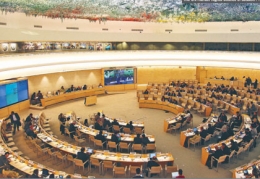On 6 October Ireland’s human rights record will come under review for the first time by other UN members.
The Irish Council for Civil Liberties (ICCL) has spearheaded Ireland’s involvement in the Universal Periodic Review, a UN-established process which aims to set guidelines for how countries can improve their human rights policies.
Some 17 organisations, including the Immigrant Council of Ireland, the Irish Traveller Movement (ITM) and The Integration Centre, contributed to Ireland’s Civil Society UPR Report, which includes numerous recommendations towards improving support for minority communities.
In 2012 the UN will formally adopt the UPR recommendations, and Ireland will be obliged to follow-up with the UN to prepare for the next review in 2016.
“Basically, the UPR is a map or a blue print for human rights,” said Deirdre Duffy, research and policy officer with the ICCL. “We can easily get 80 to 100 recommendations. Clearly, the Government won’t be able to address all of these issues, but if we’ve moved forward that’s a success.”
But politicians aren’t the only ones involved in the report. The main goal of the UPR is to include civil society, making NGOs and the people of Ireland key stakeholders in the process. To this end the Your Rights Right now campaign organised17 public information and consultation events where people could voice their concerns.
“Individuals had a big role in shaping the report,” said Duffy. “We [stakeholders] make one-third of the report, and one-third can truly make a difference.”
According to the independent Migrant Integration Policy Index (Mipex), Ireland is not as progressive as many believe. The country scored just 49 out of a possible 100 for policies that are favorable toward integration, ranking below several other European member states and the US.
For migrants, the main concerns addressed in the report include social welfare regulations, citizenship applications, racism, rights of residency and education.
Peter Szlovack, the Integration Centre’s head of residence and policy, said that the rights of refugees in particular are unclear, and emphasised that the Minister for Justice has absolute discretion over citizenship applications.
“People have been refused citizenship because they have a disability or are a single parent, but people have no control over this,” said Szlovack. “The Government wants people to be self-sufficient, but citizenship should be based on whether or not you are a law-abiding citizen.”
Szlovack said that the State needs a legal definition of racism and a response plan for designated racist crimes.
He added that at present, crimes are deemed racist in nature only at the discretion of a judge.
It is also problematic that individuals in the same family do not all share the same residency status, and it is “disconcerting” that school-level education is still largely under the patronage of the Catholic Church, he said.
“We want an education model that respects everyone’s beliefs,” said Szlovack, “something that would lead to a more diverse school system.”
Migrants aren’t the only ones feeling oppressed by the current system. Other minority groups such as Travellers are also marginalised.
“Some Irish legislation does not allow Travellers to exist or does not acknowledge them,” said ITM director Damien Peelo.
Ireland’s Civil Society UPR Report claims that the State has failed to recognise Travellers as an ethnic group, even though two UN Committees had recommended it. Peelo said that there have been many ramifications from this, including increased discrimination and a lack of protection under legislation.
“Thirteen years ago,” he said, “the Government instituted the Housing (Travellers Accommodation) Act which recognised that Travellers require accommodation other than their normal place of residence. A network of transient sites was to be built, but that has not happened.”
“My hope is that the UN holds them accountable for not living up to their promise.”
Human rights are typically seen as minority rights, but they apply to everyone, Peelo added.
“As long as one person’s rights are denied your rights have not been fully upheld.”
Ireland will be reviewed by its UN peers on 6 October, when other countries will make recommendations that Ireland must then make an effort to implement. “International dialogue takes place with the UN in Geneva,” said Duffy of the ICCL, “but the true test is to get this dialogue brought back to Ireland.”












